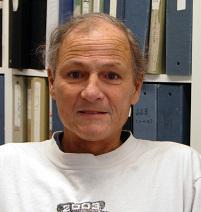
Bruce W. Chesebro, M.D.
Senior Investigator
TSE / Prion and Retroviral Pathogenesis Section
NIAID/DIR
Research Topics
Research is aimed at studying the pathogenesis of transmissible encephalopathies or prion diseases. These diseases are being studied at the biochemical, cellular, and whole animal model levels. We are currently studying both chronic wasting disease (CWD) of deer and elk as well as rodent-adapted sheep scrapie. Rodent and nonhuman primate models are being used for CWD. Mutant prion protein (PrP) molecules have been expressed in neural cell cultures and in transgenic mice to study the effects of PrP alterations on agent replication and disease development. Knockout mice that lack expression of important cytokine and chemokine genes and their receptors are also used for pathogenesis studies.
Our group also studies a transgenic mouse model expressing anchorless prion protein. This model replicates the prion/TSE agent and has extensive amyloid deposits in the brain with cerebral amyloid angiopathy similar to human brain amyloid diseases including Alzheimer’s disease. This model mimics a new fatal familial prion disease in which patients express prion protein with a stop codon near the C-terminus, thus eliminating the GPI anchoring of prion protein.
Biography
Dr. Chesebro received his M.D. from Harvard Medical School in 1968. He completed postdoctoral studies at the Karolinska Institute, Sweden, in 1967; at Stanford University from 1968 to 1970; and at the National Institute of Arthritis and Metabolic Diseases from 1970 to 1972. He came to NIAID in 1972 and became chief of the Laboratory of Persistent Viral Diseases in 1979. Elected as a Fellow in the American Academy of Microbiology, 2011.
Selected Publications
- Striebel JF, Race B, Williams K, Carroll JA, Klingeborn M, Chesebro B. Microglia are not required for prion-induced retinal photoreceptor degeneration. Acta Neuropathol Commun. 2019;7(1):48.
- Carroll JA, Race B, Williams K, Striebel J, Chesebro B. Microglia Are Critical in Host Defense against Prion Disease. J Virol. 2018;92(15).
- Race B, Williams K, Hughson AG, Jansen C, Parchi P, Rozemuller AJM, Chesebro B. Familial human prion diseases associated with prion protein mutations Y226X and G131V are transmissible to transgenic mice expressing human prion protein. Acta Neuropathol Commun. 2018;6(1):13.
- Chesebro B, Striebel J, Rangel A, Phillips K, Hughson A, Caughey B, Race B. Early Generation of New PrPSc on Blood Vessels after Brain Microinjection of Scrapie in Mice. MBio. 2015;6(5):e01419-15.
- Chesebro B, Race B, Meade-White K, Lacasse R, Race R, Klingeborn M, Striebel J, Dorward D, McGovern G, Jeffrey M. Fatal transmissible amyloid encephalopathy: a new type of prion disease associated with lack of prion protein membrane anchoring. PLoS Pathog. 2010;6(3):e1000800.
Related Scientific Focus Areas

Molecular Biology and Biochemistry
View additional Principal Investigators in Molecular Biology and Biochemistry

Microbiology and Infectious Diseases
View additional Principal Investigators in Microbiology and Infectious Diseases

This page was last updated on Tuesday, August 30, 2022